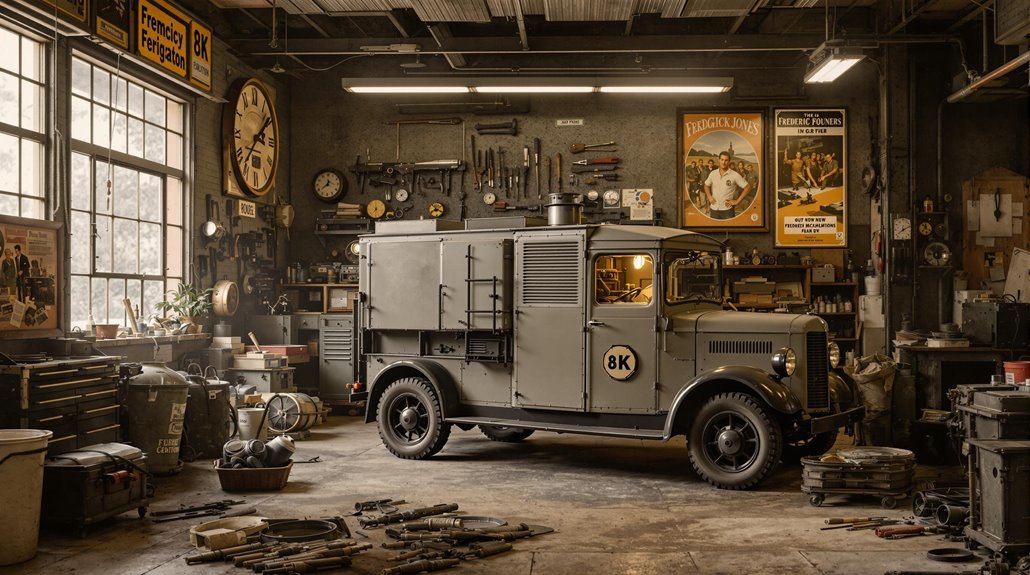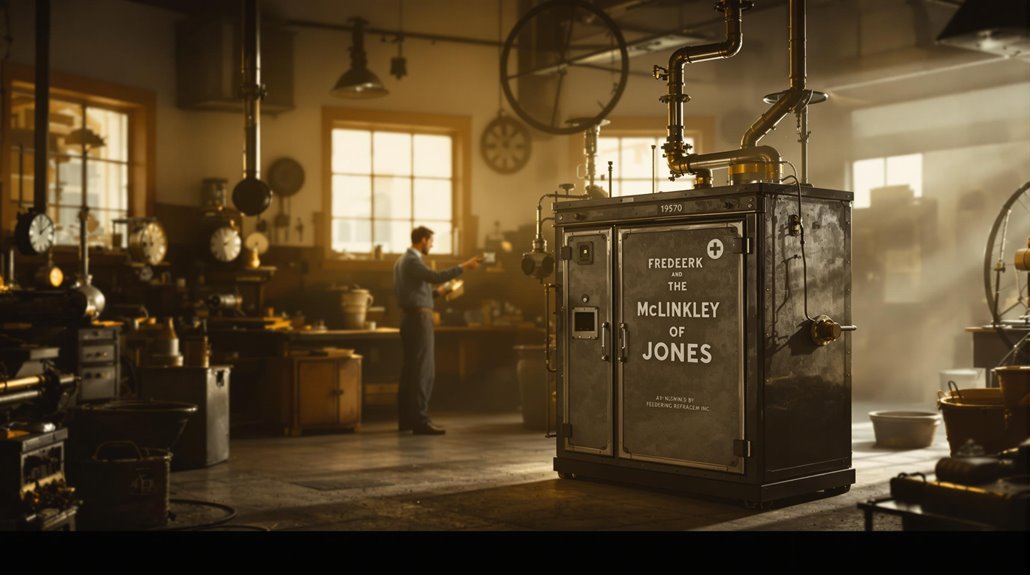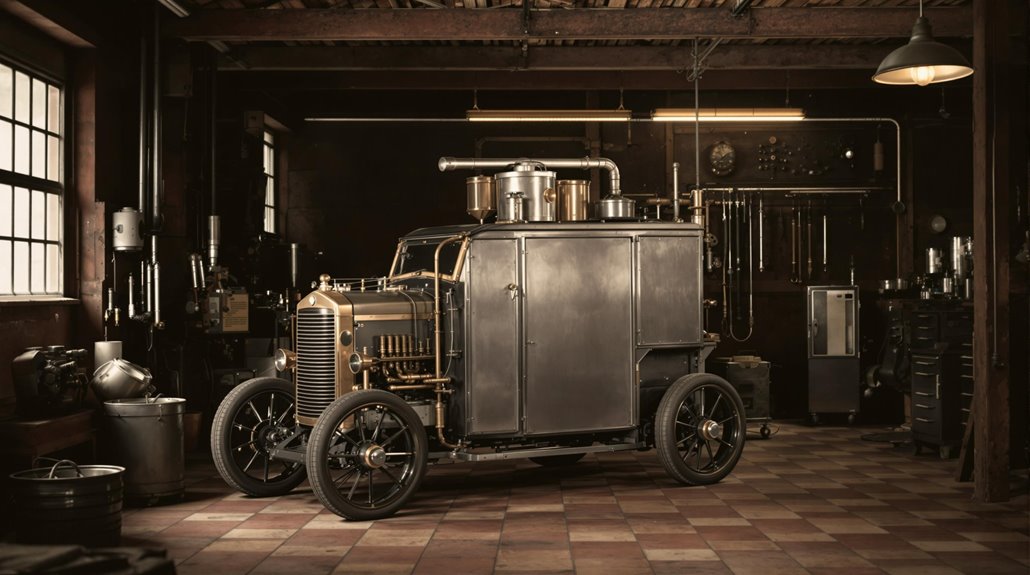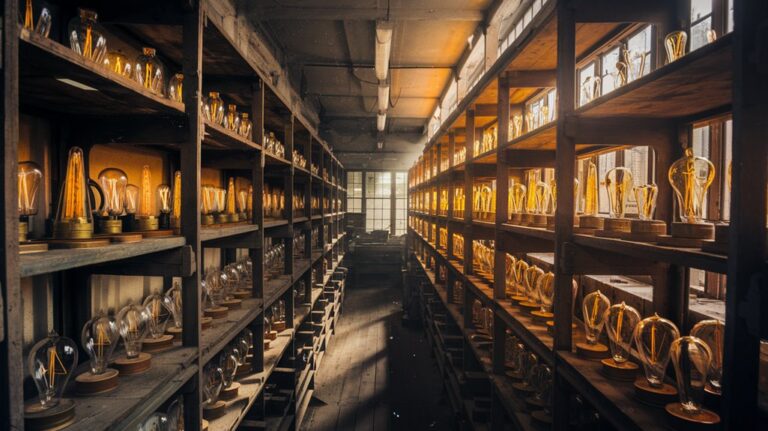Frederick McKinley Jones: How a Garage Mechanic Revolutionized the Frozen Food Aisle
You've probably never given much thought to how frozen foods make it to your local grocery store. Yet every time you grab a frozen pizza or bag of vegetables, you're benefiting from the ingenious work of Frederick McKinley Jones. This self-taught engineer transformed America's food industry with an invention born from necessity during the 1930s. His story of innovation began in a Kentucky orphanage and led to a revolution in how we transport, store, and consume perishable goods.
From Orphan to Self-Made Engineer

Against all odds, Frederick McKinley Jones transformed from an orphaned child into one of America's most innovative self-taught engineers. Born in Kentucky in 1893, his early life was marked by orphan resilience after his mother's departure and father's death left him alone by age nine.
You'll find his self education journey began at age 11 when he left school and fled to Cincinnati, making his own way as a garage cleaning boy. His natural mechanical aptitude quickly emerged, propelling him from cleaner to mechanic to garage foreman by age 15. His love for automobiles led him to become one of the best racing drivers in the Great Lakes region.
Even after being fired at 17 for racing company cars, Jones never stopped learning. He mastered electronics during WWI, earned his engineering license in Minnesota, and developed expertise across multiple technical fields through determined self-study and hands-on experience. His remarkable success came despite facing severe Jim Crow era discrimination and poverty throughout his career journey.
Early Career and Military Innovation
A young Frederick Jones found his professional footing at Cincinnati's R.C. Crothers Garage, where he quickly rose from helper to shop foreman.
By age 19, he'd mastered mechanical skills well enough to build and race cars around the Great Lakes, before moving to Minnesota to work on a massive 50,000-acre farm.
When World War I called, Jones served in an all-black unit where his talents couldn't be ignored. Living at St. Ann Catholic church during his childhood had instilled in him the discipline needed for military service.
After earning a promotion to sergeant, his electrical innovations transformed military operations – he wired entire camps for electricity, telegraph, and telephone services.
He even developed air-conditioning units for field hospitals.
His self-taught expertise in electronics led to remarkable achievements, including building his town's first radio station transmitter and creating a groundbreaking device that combined sound with motion pictures. During this inventive period, he also constructed an innovative snow machine using an airplane body and skis.
The Birth of Mobile Refrigeration
Necessity sparked Frederick Jones' most influential invention in 1938 when a truck driver shared his frustration about spoiled chicken cargo.
The existing ice-based cooling methods couldn't handle long-distance food transport, and Jones knew he could solve this mobile cooling dilemma.
A $6 bet between Joseph Numero and his trucking industry friend set Jones on a 30-day challenge to tackle these refrigeration challenges.
Through dedicated library research, Jones taught himself the principles of refrigeration and created the groundbreaking Thermo Control Model A.
Despite his minimal formal education, Jones went on to become one of America's most innovative inventors.
His success with refrigeration technology earned him over 60 patents throughout his innovative career.
His ingenious design featured a roof-mounted, shockproof system with automatic operation – perfect for trucks on rough roads.
This invention led to the formation of U.S. Thermo Control Company (later Thermo King), which transformed into a $3 million business by 1949 and revolutionized how America transported and consumed fresh food.
Transforming America's Food Transportation
Through Jones' innovative mobile refrigeration system, America's food transportation landscape underwent a dramatic transformation that reached far beyond cold storage. His invention revolutionized food logistics by eliminating the need for ice and salt preservation, allowing trucks to transport perishables across unprecedented distances. His self-taught expertise as a young mechanic laid the foundation for his groundbreaking innovations.
This breakthrough reshaped the entire supply chain, making fresh produce and temperature-sensitive goods available nationwide year-round. The technology that stemmed from his over 60 patents continued to advance the field of refrigeration for decades to come.
The impact on American food distribution was immediate and far-reaching:
- Created a new refrigerated trucking industry that transformed how food moved across the country
- Enabled grocery chains to import previously impossible-to-transport fresh goods
- Established seamless multi-modal transport options for ships, trains, and planes
You can trace today's global food marketplace directly to Jones' innovations, which turned local food systems into an interconnected network of suppliers, distributors, and retailers.
World War II Contributions and Military Support

When World War II demanded innovative solutions for military logistics, Frederick McKinley Jones answered the call by adapting his refrigeration technology for combat zones. His lightweight, portable units could be parachuted into forward areas, where they preserved essential supplies like blood plasma, medicine, and food for troops. Being an independent spirit who started working at age 12 in an auto repair garage prepared him for his future innovations.
You'll find Jones' impact went far beyond basic preservation. His units air-conditioned field hospitals in extreme heat and cooled B-29 bomber cockpits. After serving as an Army electrician in France during World War I, Jones brought valuable military experience to his wartime innovations.
The U.S. Defense Department quickly made his design their standard equipment, leading Thermo King to expand rapidly to meet wartime demands. By 1949, the company had grown into a $3 million enterprise.
Jones' contributions earned him the distinction of becoming the first African American elected to the American Society of Refrigeration Engineers in 1944, and his innovations remained significant for military operations long after the war.
A Legacy of Innovation in Transportation Technology
During his remarkable career, Frederick McKinley Jones revolutionized the transportation industry by transforming how we move perishable goods across vast distances.
His mechanical ingenuity laid the groundwork for today's sustainability practices in food transportation and inspired future innovations in mobile refrigeration technology. His extraordinary achievements led to him receiving the National Medal of Technology in 1991. After years of development, his Model C unit in 1941 proved especially successful due to its compact and durable design.
His automatic refrigeration system became the foundation for Thermo King Corporation, which grew from a $3 million business into a billion-dollar global enterprise.











